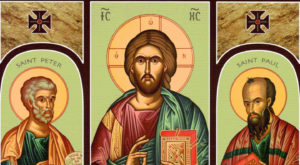 Today the Church celebrates two of its most feisty saints: Peter and Paul. The lives of these two pillars of the Church show the dynamics of vocation. They both experienced the love of Christ and were transformed through Him into their true identities. Such transformation is signaled in the change of their names. Formerly Simon, now Peter; Saul, now Paul. In the Bible, name change signals identity change, not superficially but substantially, as one’s relationship to God deepens. They are models for us on how to respond to the call of God and where we belong: in the Lord Jesus Christ. They were sinful, yet they responded to the call of the Lord. Here are three points to keep in mind when thinking about the vocations of Peter and Paul:
Today the Church celebrates two of its most feisty saints: Peter and Paul. The lives of these two pillars of the Church show the dynamics of vocation. They both experienced the love of Christ and were transformed through Him into their true identities. Such transformation is signaled in the change of their names. Formerly Simon, now Peter; Saul, now Paul. In the Bible, name change signals identity change, not superficially but substantially, as one’s relationship to God deepens. They are models for us on how to respond to the call of God and where we belong: in the Lord Jesus Christ. They were sinful, yet they responded to the call of the Lord. Here are three points to keep in mind when thinking about the vocations of Peter and Paul:
- God’s Initiative
“It was not you who chose me, but I who chose you…” (John 15:16). This flies in the face of absolute self-determination. We often think we are the masters of our own destiny and the ultimate possessors of ourselves. However, the Bible has a different view. One’s identity is a gift from God. That is why identity is related to vocation. You are a gift and response to God. Peter and Paul found themselves in God’s mind made manifest to them through Jesus Christ. This was an unveiling of their true identities, not something alien. Very often we get stuck in trying to mold ourselves into an image we conceive, but this becomes futile when it comes up against God. Idols will collapse; an identity separated from God will collapse. Follow Saints Peter and Paul and belong to the Son who belongs to the Father, and remember it is not you who has done this but God.
- From Cowardice to Courage
“Without me you can do nothing” (John 15:5). When Peter distanced himself from the Lord he was a coward, but when he grew closer to the Lord he became very courageous. Paul does not immediately strike us as a coward. There is no mention of the tears of Paul or his abandonment of the Lord like Peter. However, he indeed was a coward in the face of the nascent Church. He could not just let it be as his mentor Gamaliel suggested. Instead, he actively persecuted it: the mark of fear. However, we see how Paul became a courageous man after his encounter with the Risen Christ. Just read the Acts of the Apostles to see this. Paul inserts himself in dangerous situations to proclaim the Gospel of Jesus Christ. He would not have put himself on the line like this prior to his conversion. Courage is the act of giving oneself in the face of danger. When one grows close to the Giver they will courageously give despite the circumstance.
- Proclaim the Name of Jesus
“For we do not proclaim ourselves, but Christ Jesus as Lord” (2 Cor. 4). Unlike most careers, vocation is not centered on the self but on Jesus. The vocation of Peter and Paul was to proclaim the Gospel of Jesus as widely as possible, bringing all into the power of the name of Jesus. In the Bible, names have power. Those who were gathered in the Name were gathered in the Lord, and this Name had the power of healing and reconciliation with God. In a vocation the Lord calls you by name so as to proclaim his name. We clearly see this in Peter and Paul who spread the Name of Jesus throughout the earth.
In 2016 a noted Canadian theologian (Jesuit) addressed a Vocations Conference in Canada. I can forward you a link to his address. He strongly suggested that religious adopt some type of dress or very showy symbol that would make the “visible.” He emphasized that many young men and women never see a religious. The actually do, but do not recognize them as such, in “street clothes.” The result (??) is that there are very, very few religious now, and practically none under 35.
Our numbers dropped to 65 from nearly 200 hundred when I entered in 1954. And over 20 of these are 80++!